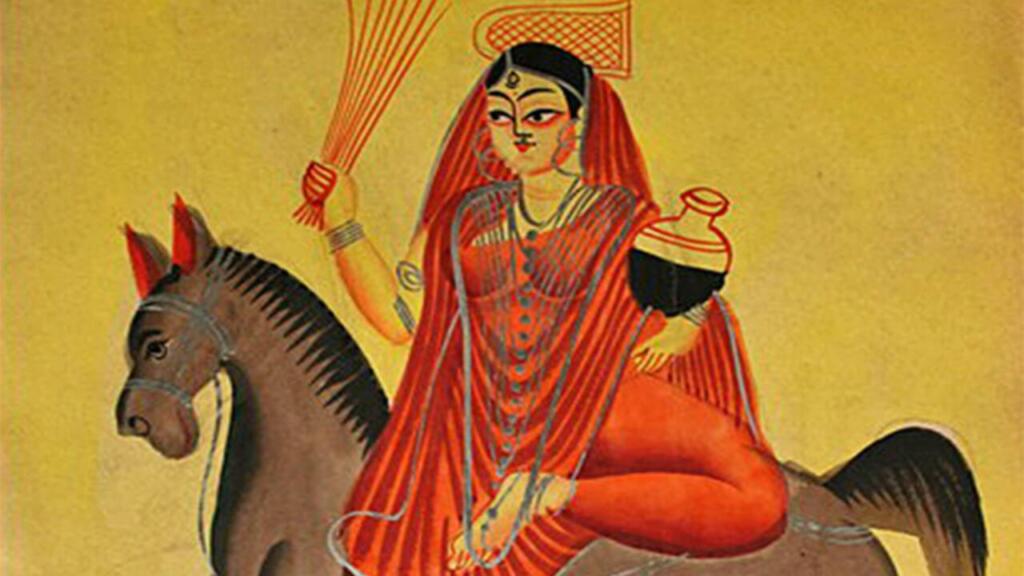Each year, on the seventh and eighth days of the waning moon in the month of Chaitra, Hindus celebrate the worship of Goddess Sheetala. Known as the deity of smallpox, Goddess Sheetala is honored during the festival called Basoda. The day before the festival, devotees prepare offerings, which are then presented to the goddess the next day as stale offerings. This ritual is believed to protect worshippers, especially young children, from smallpox.
Goddess Sheetala: A Form of Divine Power
The Skanda Purana narrates a tale about the origins of Goddess Sheetala, stating that she was born from Brahmaji. She is considered an embodiment of the divine power of Lord Shiva’s consort. According to the legend, Goddess Sheetala descended from the heavens to the earthly realm with grains of lentils in her hand, accompanied by Jwarasura, a being created from Lord Shiva’s sweat. They came to reside in the kingdom of King Virata. However, King Virata refused to allow Goddess Sheetala to stay in his kingdom.
Anger and Reconciliation
Angered by King Virata’s rejection, Goddess Sheetala caused red spots to appear on the skin of the king’s subjects, a manifestation of her wrath. These spots caused the people’s skin to burn with heat. Realizing his mistake, King Virata sought forgiveness and offered raw milk and cold lassi to Goddess Sheetala. This offering appeased her anger, and since then, it has become a tradition to offer cold dishes to the goddess.
Unique Depiction of the Goddess
The depiction of Goddess Sheetala is unique, as described in the Skanda Purana. She rides a donkey and carries a pot in one hand, containing cool water, lentil grains, and healing water. In her other hand, she holds a broom and neem leaves. She is accompanied by several deities, including Ghentukarṇa, the deity of skin diseases, the goddess of cholera, and Jwarasura, the demon of fever. The hymn dedicated to Goddess Sheetala, known as Sheetalashtak, was composed by Lord Shiva himself, according to the Skanda Purana.
Tradition and Significance
The festival of Basoda underscores the significance of Goddess Sheetala in Hindu culture, particularly in her protective role against diseases like smallpox. Additionally, offerings are prepared a day before, which are then presented as stale offerings the following day, marking the distinctive customs linked with her worship. This practice is rooted in ancient beliefs and continues to be a significant tradition for many Hindu families.
Understanding the Rituals
Goddess’s association with smallpox and other diseases makes her worship particularly important in maintaining the health of children. The rituals performed during Basoda are not only acts of devotion but also serve as a means to seek divine protection against diseases.
Historical and Cultural Context
The worship of Goddess Sheetala has historical significance, with roots tracing back to ancient times. The story of her anger and the subsequent reconciliation with King Virata underscores the power and compassion of the goddess. By offering raw milk and cold lassi, devotees acknowledge the soothing and healing qualities attributed to Goddess Sheetala. This tradition reflects a deep cultural understanding of the relationship between divine intervention and human health.
Modern-Day Observances
Today, the worship of Goddess Sheetala during Basoda continues to be an integral part of Hindu religious practices. Families prepare for the festival with great devotion and make the offerings to traditional customs. The belief in Goddess Sheetala’s protective powers remains strong, and worshipped the well-being of children.
The annual worship of Goddess Sheetala during the Basoda festival is a testament to the enduring faith and cultural traditions of the Hindu community. By honoring Goddess Sheetala, devotees seek her blessings to protect against diseases, especially smallpox. The rituals and stories associated with her worship highlight the blend of tradition, and health practices that define this unique celebration.
